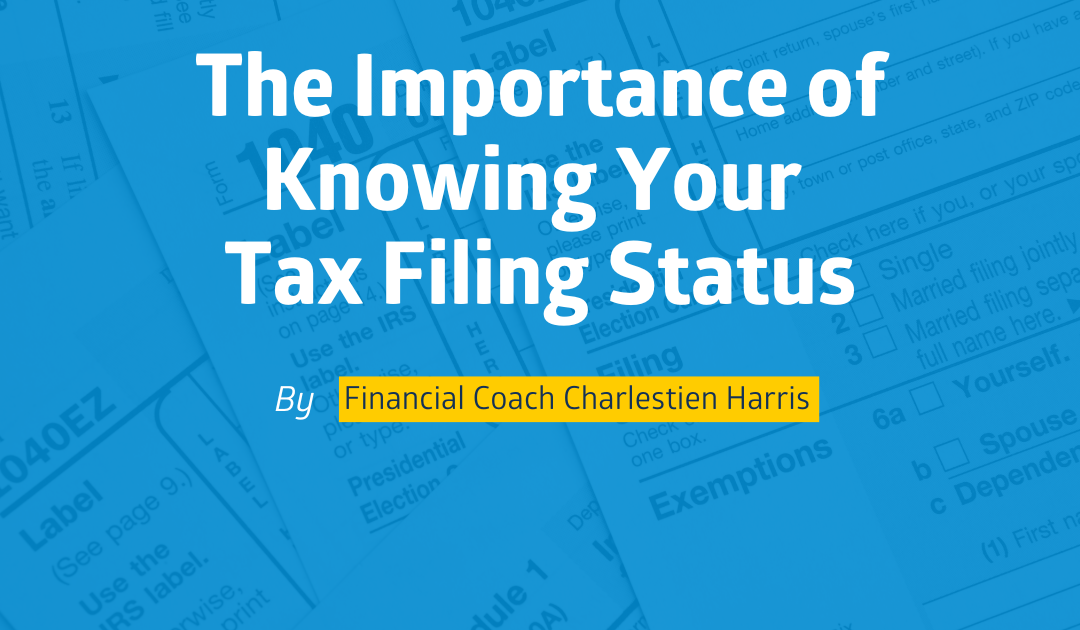By Charlestien Harris
Tax season can sometimes be one that most people do not look forward to! I think mainly because it can be time-consuming and confusing, and a lot of people are not good with numbers or keeping organized records during the year. But, one thing is for sure – it is very important for the taxpayer to know their correct filing status. A taxpayer’s filing status defines the type of tax return form they should use when filing their taxes, and can affect the amount of tax they owe. It may even determine if they have to file a tax return at all.
What determines your filing status is a question I’m often asked, so I decided to write an article to explain the importance of filing the right status. Your filing status will usually be determined by whether you are married or unmarried, and typically your marital status on the last day of the tax year determines your status for the whole year. (If your spouse passed away during the year, however, you are considered married for that year.) The IRS generally depends on the taxpayer’s marital status as of December 31. However, more than one filing status may apply in certain situations. If this is the case, taxpayers can usually choose the filing status that allows them to pay the least amount of tax. If you are not sure which filing status you should use, you can go to the IRS website www.irs.gov/forms-instructions and view Publication 501, Dependents, Standard Deduction and Filing Information.
When preparing and filing your tax return, your filing status can affect:
- Whether or not you are required to file a federal tax return
- If you should file a return to receive a refund
- Your standard deduction amount
- If you can claim certain credits
- The amount of tax you should pay
There are basically five filing statuses that the IRS recognizes: single, married filing jointly, married filing separately, head of household, and qualifying widow(er) with dependent child.
Single
This status is for taxpayers who are unmarried, divorced or legally separated under a divorce or separate maintenance decree governed by state law.
Married Filing Jointly
If the taxpayer is married, they can file a joint tax return with their spouse. When a spouse passes away, the widowed spouse can usually file a joint return for that year.
Married Filing Separately
Married couples can also choose to file separate tax returns. Doing so may result in less tax owed than filing a joint tax return. But filing this status can limit your ability to claim certain tax credits and reduce your standard deduction by as much as half!
Head of Household
This status is usually reserved for unmarried taxpayers, but special rules apply. For example, the taxpayer must have paid more than half the cost of keeping up a home for themselves and have a qualifying person living in the home for at least half of the year.
Qualifying Widow(er) with Dependent Child
This status may apply to a taxpayer if their spouse died during one of the previous two years and they have a dependent child. Other conditions also apply.
Your filing status matters because it can make a big difference in how much income tax you pay. If you make $40,000 a year, for instance, the amount of tax you will pay depends on which filing status you qualify for. The difference in tax rates is significant and can mean the difference between paying up to 10 percent or 35 percent. If you chose the wrong filing status, you can file an amended return to correct the mistake. However, if you filed using the married filing jointly status, you can’t change your status for that tax year to filing separately after the due date of the return.
Filing taxes can be a daunting task, but only if you allow it to be! The good news is that Southern Bancorp has IRS-trained VITA tax volunteers that prepare taxes for free at select branches throughout our markets for low- to moderate-income individuals. If you need tax assistance, call your local branch to see if they participate in the program, as well as the hours and days of preparation.
For more information on this and other financial topics, visit www.banksouthern.com/blog, email me at Charlestien.Harris@testbanksouthern.aceone.io, or call me at 662-624-5776.
Until next week – stay financially fit!


